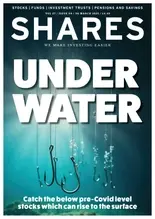
Investor sentiment improved in London on Thursday afternoon, following words from the Federal Reserve Chair Jerome Powell which helped soothe market concern over the US interest rate trajectory.
While Powell’s remarked did not make the timing of interest rate cuts any clearer, he did affirm they will happen if the US economy continues to move as expected.
The FTSE 100 index added 32.56 points, 0.4%, at 7,970.00. The FTSE 250 was up 57.98 points, 0.3%, at 19,811.62, and the AIM All-Share was up just 0.04 of a point to 742.12.
The Cboe UK 100 was up 0.5% at 796.83, the Cboe UK 250 also rose 0.5% at 17,248.84, while the Cboe Small Companies was 0.1% higher at 14,675.84.
The CAC 40 in Paris and the DAX 40 in Frankfurt both edged up 0.1%.
Equities in New York are called to open higher. The Dow Jones Industrial Average is called up 0.2%, the S&P 500 up 0.3% and the Nasdaq Composite up 0.4%.
Powell told a conference in California that the current risks to the US economy were ‘two-sided,’ with negative consequences for the economy if policymakers moved to cut rates too fast or too slow.
‘The risk, though, of moving too soon, really is...that inflation does move up,’ he said, adding that it ‘would be quite disruptive if we were to have to then come back in.’
But if the US economy continues to evolve as expected, most Fed participants still expect it will be ‘appropriate to begin lowering the policy rate at some point this year,’ he said.
Eyes now turn to Friday’s nonfarm payrolls reading, which is expected to show the pace of jobs growth eased to 200,000 in March, from 275,000 in February, according to FXStreet.
Numbers on Wednesday from payroll processor ADP showed the US private sector added more jobs in March than a month earlier.
Private sector employment increased by 184,000 jobs in March, rising from 155,000 in February. March’s jobs growth topped the FXStreet cited consensus of 148,000.
Still to come on Thursday, the latest US jobless claims reading is at 1330 BST.
The pound was quoted at $1.2662 early Thursday afternoon, up from $1.2630 late Wednesday. The euro stood at $1.0858, rising from $1.0827. Against the yen, the dollar was unmoved at JP¥151.72.
BDSwiss analyst Daniel Takieddine commented: ‘The Japanese yen continued to trade sideways after reaching the lows recorded during the last two years and could remain subdued. FX traders could refrain from significant moves as they monitor signals regarding potential interventions by Japanese authorities to curb the yen’s weakness. Hiroshi Watanabe, a former top currency diplomat, suggested that government action is unlikely unless the yen falls below 155 per dollar, which could leave some manoeuvring room for traders.’
While there was little impetus in yen trade, gold powered higher.
Gold was quoted at $2,292.62 on Thursday afternoon UK time, rising from $2,286.90 at the time of the London equities close on Wednesday. It had spiked to $2,304.89 earlier on Thursday.
XTB analyst Kathleen Brooks commented: ‘The gold price appears to rally every time there is a rise in expectations of rate cuts from the Fed. We expect this theme to continue to drive the gold price in the near term, and the precious metal could be volatile as we move towards the non-farm payrolls report on Friday.’
Brent oil was quoted at $89.19 midday Thursday, falling from $89.69 at the London equities close on Wednesday. Brent had risen as high as $89.95 on Wednesday, however.
BP traded 0.3% lower in London on Thursday afternoon, while Shell added 0.4%. The duo have climbed 2.7% and 5.1% so far this week, on the back of robust Crude prices.
Metal prices were also on the rise, AJ Bell analyst Russ Mould noted.
‘Miners were in demand as commodities prices continued to surge – an inflationary development which might provoke some nervousness about the fate of long-awaited interest rate cuts,’ Mould said.
Anglo American added 3.2%, while Antofagasta climbed 3.0%. Both were among the best FTSE 100 performers.
PageGroup surged 5.5%. UBS raised the recruiter to ’buy’ from ’neutral’.
CAB Payments jumped 12% after the cross-border payments and foreign exchange company’s Dutch subsidiary secured a payment service provider licence with De Nederlandsche Bank. It means it will now be eligible to provide its services across the entire European Economic Area operating under the name of CAB Payments Europe.
CAB Payments has had a rocky time since listing. A revenue growth warning knocked 72% off its value in a single day in October. Shares are down around two-thirds from the £3.35 initial public offering price, despite Thursday’s lofty share price rise.
AIM-listed Cirata fell 27%, as it reported annual results that were clouded by the possible fraud saga that hurt its reputation back when it was named WANdisco.
The data analysis platform posted a decline in revenue and bemoaned a ‘seemingly endless series of ’whack-a-mole’ challenges’.
Revenue in 2023 fell 31% to $6.70 billion from $9.69 billion. Its pretax loss widened to $36.5 million from $29.6 million.
‘As I reflect on the past year, it is clear that we have navigated through the most challenging period in our company’s history,’ Chief Executive Officer Stephen Kelly said.
The company added last year’s events required ‘continuous firefighting’. It almost collapsed in 2023 after the discovery of illegitimate purchase orders.
As part of its effort to move on, the company changed its name to Cirata from WANdisco in early October. Cirata noted that it had been placed under ’watchlist’ by some customers in March of last year, ‘leading to a pause in activities and the then embryonic sales pipeline coming to a standstill’.
Analysts at Stifel said the yearly results showed ‘some healthy signs of progress’.
‘Better than expected cash was already announced at the trading update and today revenue is comfortably ahead of our estimate. This is coupled with costs that have reduced further providing continuity with our existing forecasts which we leave unchanged at this time. The company appears to have made meaningful progress, transforming itself into a more professional organisation and maintains its target of reaching run-rate cash flow breakeven in the current year, despite ongoing deal slippage and an understandable second-half weighted bookings expectation,’ Stifel added.
Copyright 2024 Alliance News Ltd. All Rights Reserved.




